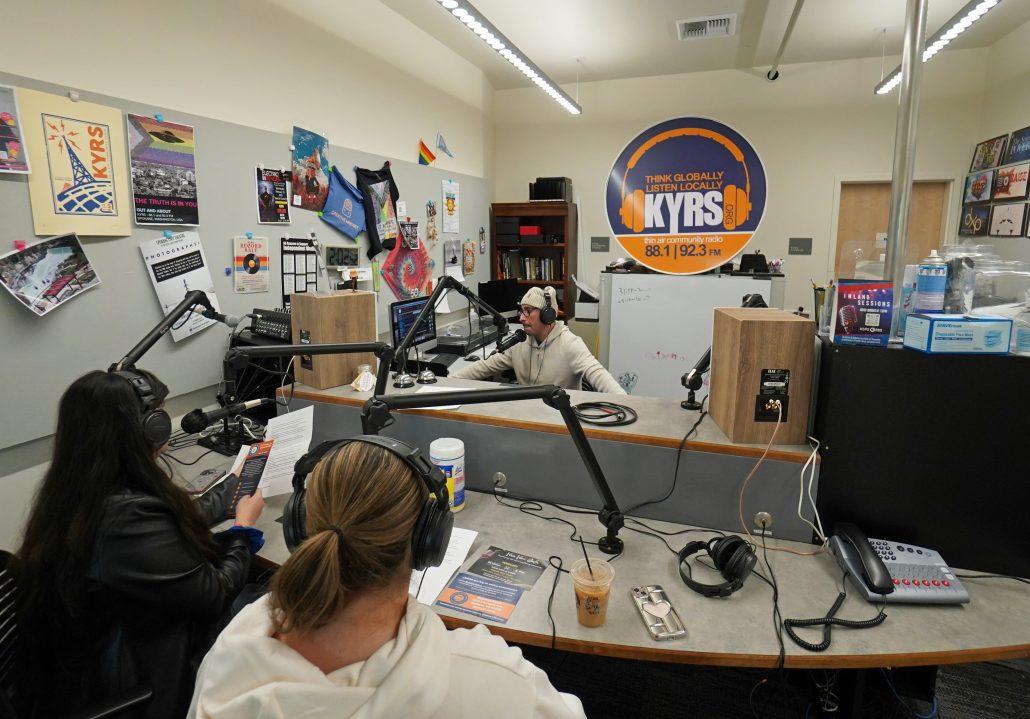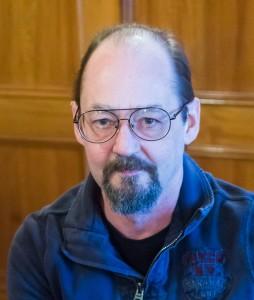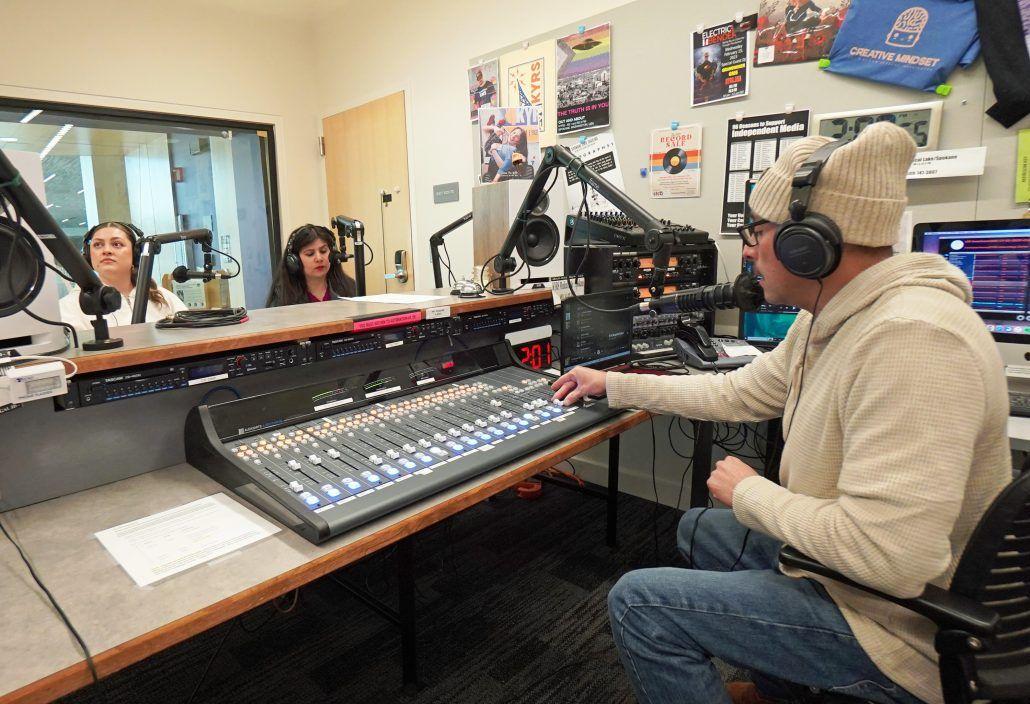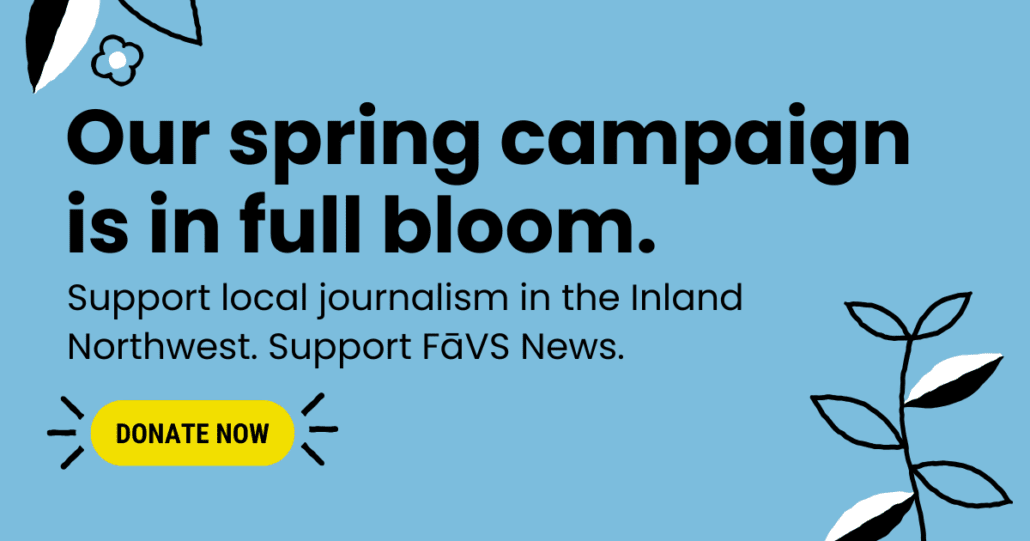‘El Puente’ DJ blends music, interviews and resources to build bridge to Spokane Latinos
News Story and Photos by John McCallum | FāVS News
Every Monday afternoon, Rafael Zamora sits in front of a console at a downtown Spokane radio station and builds a bridge — a communication bridge between himself and his listeners.
Through “El Puente,” Zamora brings information about resources Spokane’s fast-growing Latino community is lacking — information on employment, health services, education opportunities and legal services.
Many in this community face challenges even when this information is readily available. Many are newcomers, refugees or migrants who aren’t fluent in English. Many are fearful about being public about their needs.

“’El Puente’ was born to bridge that gap, offering vital information and a sense of connection to the diverse Latino culture in our community,” Zamora said in an early January 2025, KYRS Thin Air Community Radio 88.1/92.3 FM news release announcing the airing of the show.
“It’s a resource for those seeking jobs, safety and cultural belonging,” he said.
Spokane’s Hispanic/Latino community numbers
According to U.S. Census Bureau statistics for 2023, 7.3% of Spokane County’s total population of 551,455 individuals identified as Hispanic/Latino — about 36,397 people. That’s up from 2020’s 35,596, which represented 6.6% of the county’s total population of 539,339, and almost a 50% increase from the 31,101 who made up 4.5% of the county’s 2010 population of 471,221.
Those numbers represent the largest racial group outside of “white alone,” which in 2023 was 81.9% of the total population. That figure is a decrease from the 82.1% in 2020 and the 89.2% in 2010.
“It’s growing, especially after 2010,” Zamora said in a Feb. 10 interview of the Hispanic/Latino population.
“Before, not a lot of Spanish spoken here,” he said. “After 2010, [we’re] finding more speakers. Most come from California, Oregon, Texas and Florida.”
Zamora and his family are among those who moved from Mexico to the San Fernando Valley in California and then from there to Spokane in 2007. He works during the day for a furniture manufacturer while his wife works at a Latino nonprofit organization. They have three children, ages 20, 18 and 13.
“We love it,” Zamora said of Spokane. “A very nice place. The people are nice.”
A need to do something for Spokane Latinos
Zamora said the Hispanic/Latino population is composed of people from countries in Central and South America as well as the Caribbean. Each brings unique cultures, perceptions and beliefs to the region that are expressed through different foods, social practices and music.
Zamora felt local radio wasn’t meeting the needs of these various communities for information, entertainment and providing a sense of empowerment. So, confined at home in 2020 because of the COVID pandemic, he sought to change that.
Zamora was a regular listener of an online station out of Mexico. He knew the station had listeners throughout the world and thought he might be able to do something similar in Spokane.
“If they made it online, I can make my own station in Spokane,” Zamora said. “I had nothing to do and needed to do something. I couldn’t sit on my couch all day.”
Zamora found online resources on how to do things like set up a website, select music and produce radio jingles for advertising and announcements. He budgeted time each evening to work on his project, and in April 2020, Spokane Latin Radio (SLR) was born.
Zamora said he provided information on pandemic-related issues like where to get masks, vaccines, other medical needs as well as assistance with food and living expenses. He also began making contacts with individuals and organizations in the Latino community who wanted to get information out about their work.
SLR operates today, and Zamora said he exceeds 10,000 listeners in Spokane and 27,000 listeners when Europe, Central and South America are factored in. The last time he checked, Zamora said he had 65,000 listeners from 125 countries.
“Satisfaction is my payment,” he said when asked what he gets out of SLR.
Finding Thin Air Radio
Even with the online success, Zamora felt there was a community he was missing in Spokane. That community consisted of Latinos not skilled in the online world, but listeners of good, old-fashioned AM/FM radio.
Enter KYRS program director/graphic designer Dana Matthews. Matthews knew about SLR, and he and Zamora’s paths had crossed several times. Beginning last November, the two talked about a show at KYRS.

“What we would really love is to have a Latin affairs show for the community, which was something lacking,” Matthews said.
Zamora was already in possession of those resources and contacts through SLR.
“It seemed like the ideal thing,” Matthews said. “KYRS’s mission is to give voice to those who wouldn’t normally get the time.”
According to its website, KYRS Thin Air Radio began in 1999 when local community activists learned the Federal Communications Commission was going to open up the “public” airwaves to low power FM community stations as a “secondary service” with limited rights.
After waiting two years for a license, it took eight months to put the station together, including erecting a 120-foot tower with partially donated labor. KYRS came on air on Oct. 26, 2003, broadcasting at 100 watts. They achieved 501(c)(3) status in 2007 and became a full-power — 6,800 watts — non-commercial on Nov. 5, 2011, reaching as far as north as Kettle Falls.
KYRS is run almost entirely by volunteers, providing programming on local public affairs, culture, environmental news, LGBTQIA, women’s issues and youth programs — for starters. They have won 23 awards over the years, including being recognized as one of Spokane’s top-3 radio stations seven times.
“We have always been a voice for our community,” Matthews said. “We are really the epitome of the freedom of the press and we’re going to stick with that.”
‘El Puente’ comes alive
“El Puente” began in mid-January 2025. Zamora said he spends four to five hours one evening one evening a week preparing content for the show, lining up interviews and programming music.
He arrives at KYRS’s third-floor studios in the Spokane Public Library’s downtown branch about 15 minutes before 2 p.m. to get settled in, with his equipment ready to go and greets and talks to his guests. The show begins with a couple songs from current Latin music artists, followed by the introduction of guests.
That is followed by one or two more songs, and the cycle repeats throughout the 50-55-minute program, with Zamora asking questions as well as making comments and observations.

Guests have included the manager of Mercadito de Latinos in Spokane, Andres Sanchez; Mujeres in Action (MIA), a Spokane organization “that supports survivors of domestic violence and sexual assault in a culturally responsive way;” the Union Futbol Club, departments from Nuestra Raices (Our Roots), a 501(c)(3) community center founded by the Hispanic Professional Business Association; and TERRA with Teresa Sorroche and Montserrat Stock who “offer workshops and techniques for mental development and assisted meditation online entirely in Spanish to help and support the Hispanic community.”
Matthews said Zamora has a good personality to help bring this information to people in the Latino community as well as the larger Spokane region.
“People are grateful to have him on the air,” he said. “We’re just in a really lucky position to have someone like that.”
Spokane Hispanic/Latino challenges
Nuestra Raices Development Manager Jennifer Contreras and Public Relations and Marketing Outreach Brianda Perez joined Zamora for the Feb. 10 show to talk about services offered to the Hispanic/Latino community such as education opportunities and financial and legal assistance for challenges presented by current events.
Among the latter are those stemming from deportation efforts underway from the administration of U.S. President Donald Trump, and the impacts it is having on the Spokane Latino community. Zamora said many residents of the community moved here because of the offer of better jobs, better schools for their children and a better life.
The impacts of these deportations by officers of the federal Immigration and Customs Enforcement (ICE) are being felt not only among undocumented migrants but those in this country legally and even naturally.
Recently, an El Salvador man in Maryland was deported to that country and imprisoned because of an “administrative error,” according to court filings from Trump administration officials. The man has lived in the U.S. since 2019 and his wife and 5-year-old child are both U.S. citizens.
On March 21, Trump signed an executive order revoking legal visa status for 530,000 Cubans, Haitians, Nicaraguans and Venezuelans living in the U.S.
On March 10, ICE agents arrested two men in Spokane Valley — one close to receiving his Green Card — on their way to court by smashing the windows of the vehicle they were traveling in.
On March 11, Washington State Attorney General Nick Brown filed a lawsuit against Adams County Sheriff Dale J. Wagner, claiming the sheriff has been breaking the state’s Keep Washington Working Act for at least three years by helping ICE agents roundup and collect information on suspected undocumented residents. Wagner claims the law passed in 2019 is “illegal.”
All of this and more has had a chilling effect on Spokane’s Latino community.
“Everyone is afraid to simply do things as common as going to the store, going to work, taking their children to school, going to church,” Zamora wrote in an email. “They feel vulnerable, threatened and intimidated, powerless to get out of this since most are just working people, parents who are just looking to support their children and family and generally without committing any crimes.”
But not everything is negative, Zamora added. Currently, there are several associations making efforts to inform and assist migrants with immigration issues.
And through it all, Zamora continues to build a bridge.










